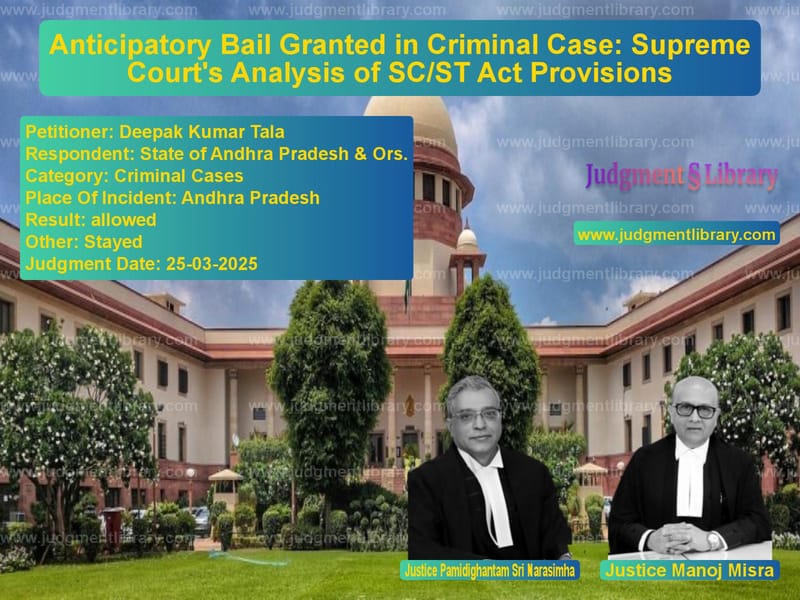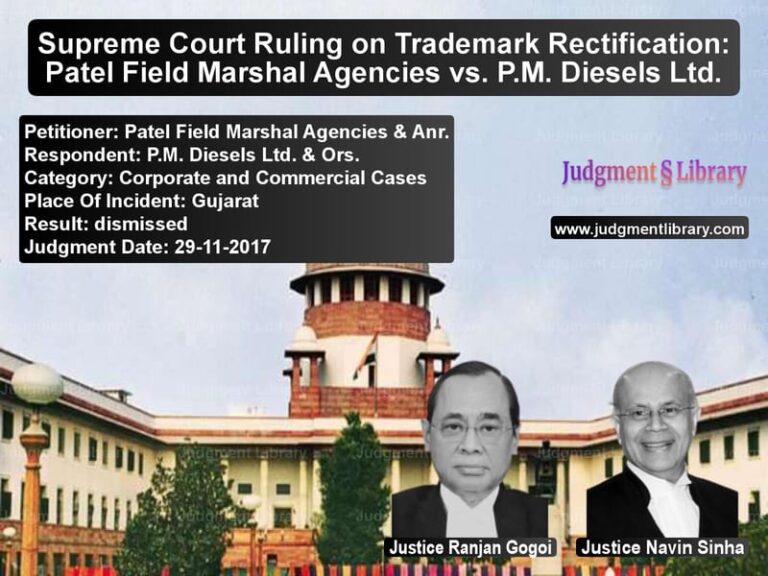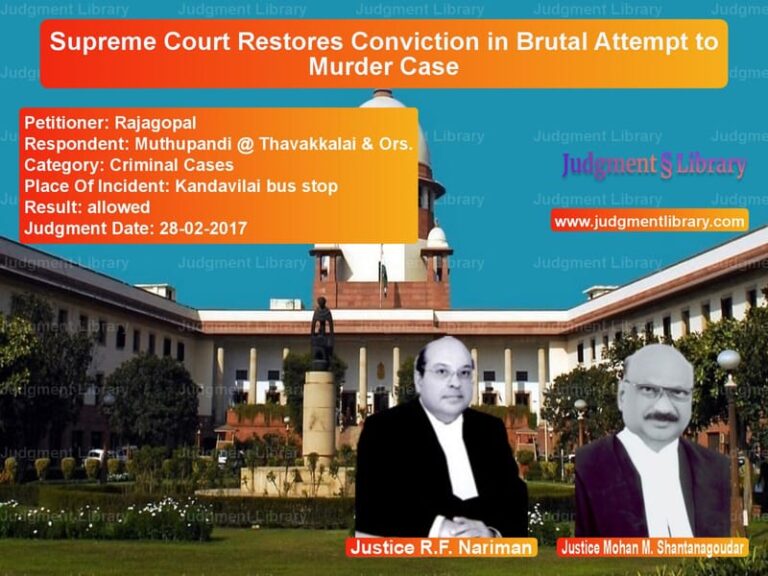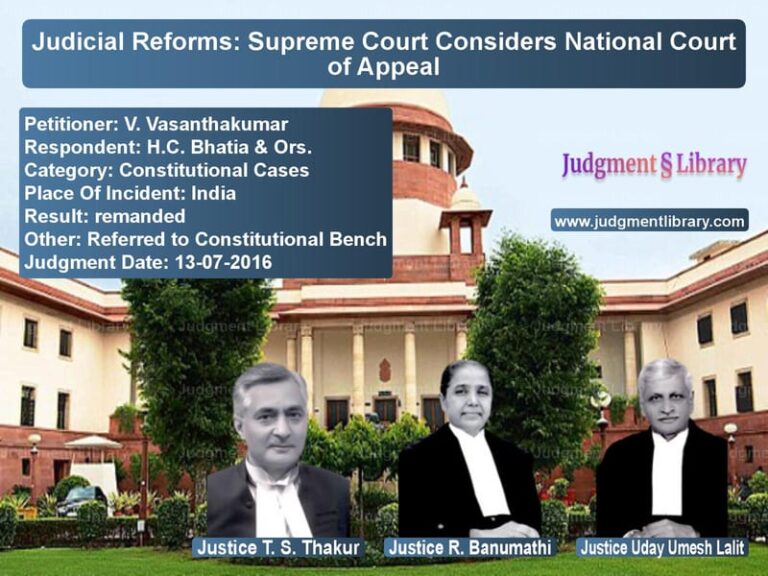Anticipatory Bail Granted in Criminal Case: Supreme Court’s Analysis of SC/ST Act Provisions
In a recent judgment, the Supreme Court granted anticipatory bail to the appellant, Deepak Kumar Tala, who was accused under various provisions of the Indian Penal Code (IPC) and the Scheduled Castes and Scheduled Tribes (Prevention of Atrocities) Act, 1989. The case revolved around allegations of criminal intimidation, abduction, and caste-based abuse in relation to a temple trust dispute. The Court carefully examined the allegations, the legal requirements under the SC/ST Act, and prior judicial precedents before arriving at its decision.
Background of the Case
The case arose from an FIR lodged by Respondent No. 3 at P.S. G.D. Nellore UPS on April 18, 2024, under FIR No. 69 of 2024. The complainant, belonging to a Scheduled Caste, alleged that he had been forced by the appellant and others to transfer temple lands. Upon refusal, the appellant allegedly abused him using caste-based slurs, threatened to kill him, and prevented him from reciting prayers. The situation escalated on April 18, 2024, when the complainant was abducted by several accused persons and kept locked up at different locations until April 29, 2024. On that day, the accused allegedly took him to a petrol station and threatened him at knifepoint, forcing him to agree to the land transfer.
Before any actual transfer took place, the complainant was rescued by the police, leading to the arrest of four accused persons. The appellant, however, sought anticipatory bail, which was initially denied by the Trial Court on August 24, 2024, and later by the Andhra Pradesh High Court on November 18, 2024. This led to the present appeal before the Supreme Court.
Legal Issues Considered
- Whether the allegations under the SC/ST Act were prima facie made out against the appellant.
- Whether the appellant’s involvement in the alleged conspiracy was supported by direct evidence or merely inferential.
- Whether the appellant’s association with the complainant in the temple trust activities affected the credibility of the allegations.
- Whether the appellant was entitled to anticipatory bail in light of the established legal principles.
Arguments by the Petitioner (Deepak Kumar Tala)
- The appellant contended that the allegations were exaggerated and motivated by previous property disputes.
- He argued that the FIR failed to establish a case under the SC/ST Act, as the caste-based insult was allegedly made in private, not in public view.
- He pointed out that the complainant and he had been associated with the temple trust since 2012, and disputes over temple property had led to multiple civil suits filed by the appellant in 2017.
The petitioner’s counsel stated: “The allegations are based on inference rather than direct evidence. The complainant’s claims about abduction and criminal intimidation are unsubstantiated, and the invocation of the SC/ST Act is legally unsustainable.”
Read also: https://judgmentlibrary.com/supreme-court-quashes-criminal-proceedings-in-jothiragawan-v-state-case/
Arguments by the Respondents (State of Andhra Pradesh & Others)
- The State opposed the bail application, arguing that the appellant’s involvement in the abduction and threats was clearly stated in the FIR.
- They contended that caste-based abuse should be viewed in the context of power dynamics and that a lack of public witnesses did not negate the intent behind the act.
- The prosecution emphasized that granting anticipatory bail could hinder the investigation and intimidate the complainant.
The respondents’ counsel argued: “Given the gravity of the offenses, including abduction, criminal intimidation, and conspiracy, the appellant should not be granted anticipatory bail. The impact of his actions on the complainant, a member of a marginalized community, must be given due consideration.”
Supreme Court’s Observations and Ruling
The Supreme Court meticulously examined the FIR, the legal provisions invoked, and the precedents governing anticipatory bail in cases under the SC/ST Act. The Court made the following key observations:
- There was only one alleged instance of caste-based abuse, and it was not made in public view, which is an essential ingredient for an offense under Sections 3(1)(r) and 3(1)(s) of the SC/ST Act.
- The allegations regarding the appellant’s involvement in the conspiracy for abduction and criminal intimidation were largely inferential, meaning they could only be conclusively determined during trial.
- The appellant and the complainant had a long history of association, and the FIR itself acknowledged that their disputes had started in 2017 over temple property.
The Court ruled: “From a prima facie examination of the FIR, it is clear that the essential ingredient for attracting Sections 3(1)(r) and 3(1)(s) of the SC/ST Act—i.e., that such statement must be made within public view—is not made out.”
Addressing the broader allegations, the Court noted: “The appellant’s role in the alleged conspiracy is inferential and requires further examination during trial. While the allegations are serious, the principles governing anticipatory bail must be applied in a balanced manner.”
Final Judgment and Bail Conditions
Considering these factors, the Supreme Court allowed the appeal and granted anticipatory bail to the appellant. The key directions issued by the Court were as follows:
- The appellant shall be released on bail in the event of arrest, subject to terms and conditions imposed by the Trial Court.
- The appellant shall cooperate with the investigation and shall not influence witnesses in any manner.
- The observations made in the judgment will not affect the trial’s outcome, and the investigating agency shall proceed independently.
The Court concluded: “We make it clear that we have not expressed any opinion on the merits of the matter and that the observations made in our order will have no bearing on the conduct of the trial or the final decision in the criminal proceedings.”
Conclusion
This ruling clarifies the scope of anticipatory bail under the SC/ST Act, reaffirming that judicial scrutiny is essential to ensure fair application of the law. The judgment emphasizes the importance of public view in caste-based abuse allegations and highlights the principle that anticipatory bail should not be denied merely based on inferential claims.
The case sets a precedent for future bail applications in similar circumstances, ensuring that procedural safeguards remain intact while protecting the rights of both complainants and accused individuals.
Petitioner Name: Deepak Kumar Tala.Respondent Name: State of Andhra Pradesh & Ors..Judgment By: Justice Pamidighantam Sri Narasimha, Justice Manoj Misra.Place Of Incident: Andhra Pradesh.Judgment Date: 25-03-2025.
Don’t miss out on the full details! Download the complete judgment in PDF format below and gain valuable insights instantly!
Download Judgment: deepak-kumar-tala-vs-state-of-andhra-prad-supreme-court-of-india-judgment-dated-25-03-2025.pdf
Directly Download Judgment: Directly download this Judgment
See all petitions in Bail and Anticipatory Bail
See all petitions in SC/ST Act Case
See all petitions in Judgment by P.S. Narasimha
See all petitions in Judgment by Manoj Misra
See all petitions in allowed
See all petitions in Stayed
See all petitions in supreme court of India judgments March 2025
See all petitions in 2025 judgments
See all posts in Criminal Cases Category
See all allowed petitions in Criminal Cases Category
See all Dismissed petitions in Criminal Cases Category
See all partially allowed petitions in Criminal Cases Category







